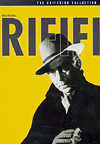Rififi
Criterion Collection
Cast: Jean Servais, Magali Noel, Carl Mohner, Robert Manuel, Jules Dassin, Marie Sabouret
Extras: Director Interview, Production Stills & Notes, Theatrical Trailer
Rating:
Jules Dassin was one of many directors churning out mass-market thrillers for MGM in the 1940s. Named a communist by the McCarthyites, Dassin headed into exile in Paris, France. Just as he was about to give up on ever directing another motion picture, Dassin was offered the chance to direct a script that he thoroughly despised. Seeing no other opportunities on the horizon, Dassin grudgingly accepted the job. The film that he went on to make stands as one of the finest examples of French New Wave cinema (with a healthy dash of film noir thrown in) and has inspired countless imitators in the decades following its release. That film is "Rififi."
"Rififi" is a sensory delight from start to finish. The film has the look and feel of a classic Hollywood film noir — dark streets, shady nightclubs, fedoras galore, a saucy temptress, and a reluctant anti-hero. But as one of the first examples of the coming French New Wave, the film also exhibits something different — an existential point of view that focuses on the individual as a freely-thinking character trapped in an often confusing and absurd world. Dassin’s (and set designer Alexandre Trauner’s) lovingly realistic portrayal of Parisian alleyways, bars, and cafés is full of the natural lighting and sound that would later come to be associated with the New Wave style.
But "Rififi" is best known, and rightfully so, for the heist that is at the center of its tale. For thirty glorious minutes Dassin offers a virtual primer on how to not only film a heist but actually execute one as well. In fact, the film was heavily edited in a number of countries as it was thought that this scene was a little too realistic. This deliberately paced sequence is full of tension and surprises and is filmed in almost complete silence with no musical score or dialogue other than the strained breaths of the thieves coupled with the soft clink of the tools of their trade. Any film in the past four decades featuring an elaborate heist scene draws its inspiration from the original and still the best — "Rififi."
Presented in its original full-frame, 1.33:1 aspect ratio, "Rififi" is a black and white delight. Blacks are deeper than one might expect and the fine detail apparent throughout the film is a revelation. To fully appreciate this transfer you’re going to have to turn the lights all the way down and let the blacks, grays, and whites come alive. As stated on the liner notes, 23,235 blemishes were digitally removed from the film elements and this attention to detail really shows in this surprisngly clear print. "Rififi" has simply never looked this good.
The extras on the DVD may not sound like much but they complement the film nicely. First up is an indexed interview with director Jules Dassin in which he reminisces about his time in Hollywood, his life in Paris, and his utter shock at how successful and influential this film proved to be. Mr. Dassin’s conversational manner makes this interview a delightful, informative piece.
Next up are a series of production stills, notes, and set design drawings that shed some light on the creation of "Rififi." Finally, the film’s American theatrical trailer is presented dubbed in English. The trailer makes "Rififi" out to be some sort of disjointed mess about a nightclub singer’s love triangle gone wrong. If I had been a moviegoer back then the only thing in that trailer that would have piqued my interest would have been the glowing comments from the hard-to-please gossip-monger Walter Winchell.
"Rififi" is highly recommended and fans of film noir and French cinema really have no choice but to buy this DVD.







